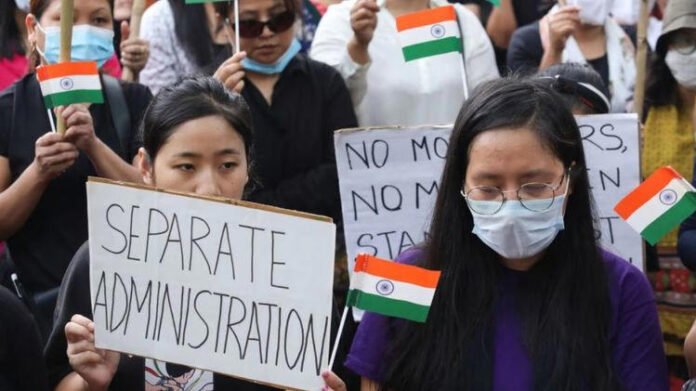Kuki groups demand buffer zones in Manipur alongside a call for a separate Union territory. This demand arises amid rising ethnic tensions and conflicts in the northeastern state, where the Kuki community seeks safeguards to protect their people and culture.
The Kuki groups’ demand highlights their concern for safety and political autonomy. Buffer zones, they argue, will reduce direct conflict with other ethnic groups. Furthermore, a separate Union territory status would grant them administrative independence and greater control over their affairs.
Read More: Doomdooma College Opening Soon; Borsola Hospital Update
Background of the Kuki Demand
Manipur has witnessed several ethnic conflicts over the years, with the Kuki community often caught in the crossfire. The demand for buffer zones aims to create a neutral space between Kuki-dominated areas and those of other communities to prevent clashes.
The idea of a separate Union territory stems from the Kuki groups’ desire for political recognition and self-governance. They believe that only through such autonomy can they safeguard their cultural identity and ensure lasting peace.
Buffer Zones as a Means to Peace
Buffer zones have worked in conflict areas globally by physically separating warring groups. The Kuki leaders propose establishing these zones as a confidence-building measure, hoping it will curb violence and foster coexistence.
These zones would act as demilitarized areas, monitored by the central government or neutral forces. Such arrangements could ease tensions and pave the way for dialogue among Manipur’s diverse ethnic communities.
The Call for a Separate Union Territory
Alongside buffer zones, Kuki groups strongly advocate for a separate Union territory in Manipur. This demand reflects their aspiration for administrative autonomy within India.
A Union territory status would provide the Kukis with greater control over local governance, resources, and cultural affairs. They argue this autonomy is essential to prevent marginalization and protect their community’s rights.
Political and Social Implications
The demand for buffer zones and a separate Union territory carries significant political implications. It challenges the existing administrative setup and calls for increased central government involvement in Manipur.
Moreover, it could reshape the region’s ethnic dynamics. While some groups may welcome peace efforts, others might view these demands as divisive or threatening to their interests.
Government Response and Prospects
The state and central governments have yet to officially respond to the Kuki groups’ demands. However, dialogue and negotiations are expected, given the sensitive nature of ethnic relations in Manipur.
Authorities will need to balance various community interests while maintaining law and order. Any decision on buffer zones or Union territory status will require careful consultation and consensus building.
Towards Stability in Manipur
The call by Kuki groups demand buffer zones and a separate Union territory reflects ongoing efforts to find lasting solutions to Manipur’s ethnic conflicts. While challenges remain, these demands highlight the importance of dialogue, autonomy, and protection for minority communities.
Moving forward, the government and stakeholders must work together to address grievances and promote peace. Establishing buffer zones and considering administrative autonomy could be key steps toward stability in Manipur.
Read More: 9 Destinations to Experience Tribal Culture in India


